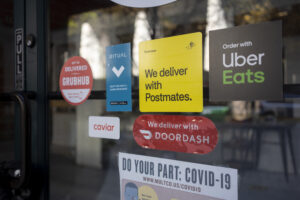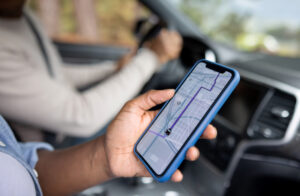Key Points:
- Rideshare drivers and their vehicles must have more than one insurance policy – knowing which policy was in effect at the time of the accident matters
- When not transporting passengers, Lyft drivers must have their own insurance coverage like all other drivers according to Georgia law
- In accident situations, the matter of who is at fault will apply. The driver who caused the accident will be expected to pay for damages
- Georgia subscribes to the Comparative Negligence doctrine, meaning your degree of negligence or fault in an accident, will determine your degree of liability
- Negotiating a settlement in an accident involving a rideshare contractor can be complicated, consulting with an attorney is advised
Thanks in part to the Hartfield-Jackson Airport; Atlanta is a bustling hub of international travel. In and around Atlanta, the rideshare industry is growing exponentially. Companies like Lyft, which uses cell-phone apps to connect passengers with drivers who offer transportation in their private vehicles, have become a valuable new player in the transportation sector.
Because Lyft drivers are essentially private contractors who are not always on duty, questions concerning insurance coverage often arise. Can Lyft passengers be sure their injuries will be covered in the event of an accident? The short answer is, probably. However, as with all other insurance questions, there are important variables.
Will Lyft Compensate Me for My Injuries?
When you are in an accident involving a Lyft vehicle or driver, your eligibility for compensation will depend upon a number of factors, including:
- Who was at fault for the accident:
- If the Lyft driver was found to be negligent and caused the accident, you are likely eligible for compensation regardless of whether you were a passenger, another driver, cyclist, or pedestrian.
- If another driver caused the accident, their insurance would be the primary source of compensation. However, Lyft’s insurance may provide additional coverage if the other driver is uninsured or underinsured.
- Even if you were partially at fault for the accident, you may still be eligible for compensation. However, your compensation amount may be reduced based on your percentage of fault.
- The extent of your injuries and damages:
- Medical bills: You are entitled to compensation for all medical expenses related to your injuries, including ambulance fees, emergency room visits, doctor appointments, medication, and physical therapy.
- Lost wages: If you are unable to work due to your injuries, you are also entitled to compensation for lost wages.
- Pain and suffering: You may also be able to recover compensation for pain and suffering, emotional distress, and other non-economic damages.
- Property damage: If your property was damaged in the accident, such as your car or personal belongings, you are entitled to compensation for repairs or replacement.
- The specific circumstances of the accident:
- Was the Lyft driver on the clock? Lyft’s insurance coverage varies depending on whether the driver was logged into the app waiting for a ride, actively on a ride with a passenger, or logged off.
- Were you a passenger, driver, or other party involved? Your role in the situation will determine the specific insurance policies and coverage applicable to your claim.
Rideshare Insurance Coverage is Complicated
Rideshare insurance coverage can be very complicated because of factors that change from accident to accident.
One key factor is the status of the vehicle and the fare at the time of the accident. Whether or not the Lyft driver is in the process of waiting for or actively transporting a passenger makes all the difference in determining which insurance policy is primary in the event of an accident.
When, at the time of the accident, the driver was transporting a passenger, Lyft’s $1 million third-party liability insurance becomes primary, covering your injuries and property damage if the driver is at fault.
If the Lyft driver is on the way to pick up a passenger or waiting at the curb for a passenger to enter the vehicle, Lyft’s contingent liability coverage steps in if the passenger’s personal insurance doesn’t apply fully. This coverage has a lower limit ($50,000 per person, $100,000 per accident, and $25,000 for property damage).
During the time when the driver and his/her vehicle are offline and engaged in personal use, and are not in the process of picking up or transporting a passenger, the driver’s personal insurance becomes primary. In this situation, you would file a claim against the driver’s personal insurance.
Accidents Involving Non-Passengers
When you’re not a Lyft passenger and involved in an accident with a Lyft vehicle, the situation varies depending on the context of the driver’s status and several other factors, the most important one being, the driver’s status.
If the driver is on-duty: If the driver was logged into the Lyft app and looking for passengers, Lyft’s supplemental insurance coverage kicks in. This typically offers up to $1 million in liability coverage.
If the driver is off-duty: If the driver was not logged into the app and on personal time, their personal auto insurance applies.
Another key factor is who was at fault:
- Driver’s fault: If the Lyft driver was found to be at fault for the accident, you can file a claim against their insurance.
- Shared fault: If both parties share responsibility for the accident, your recovery may be reduced based on your percentage of fault.
- Third-party fault: If another driver caused the accident, you can file a claim against their insurance.
Other Accident Scenarios:
If you were injured in another way – for example, if you were a vehicle occupant in another car involved in the accident, the specific details of the accident and your role will determine who is liable and how you can seek compensation.
If you were injured as a pedestrian and were hit by a Lyft driver as a pedestrian, the above criteria apply. You may also have additional claims depending on the circumstances, such as if you were crossing the street with the right of way.
When cyclists are injured, the process issimilar to that with pedestrians. Cyclists can typically seek compensation through the driver’s insurance or Lyft’s coverage if the driver was at fault.
How Much Insurance Coverage Does Lyft Carry?
Lyft’s insurance policy limits vary depending on the situation and which coverage applies.
Liability insurance: In the context of insurance, “third party liability” refers to a type of insurance that covers you when someone else makes a claim against you for damages. This typically applies to situations where you are considered negligent and your actions cause harm to someone else or their property. An example of this would be if you cause an accident and injure another driver or damage their car, your insurance will cover the costs.
General liability insurance for businesses helps protect them from claims arising from customer injuries, property damage, or even lawsuits from competitors.
- Per person bodily injury: $50,000 (if your personal insurance doesn’t apply)
- Per accident bodily injury: $100,000 (if your personal insurance doesn’t apply)
- Property damage: $25,000 (if your personal insurance doesn’t apply)
- Ride in progress with passenger: $1 million per accident
Contingent liability insurance:
- Per person bodily injury: $50,000 (applicable when your personal insurance doesn’t cover the full amount)
- Per accident bodily injury: $100,000 (applicable when your personal insurance doesn’t cover the full amount)
- Property damage: $25,000 (applicable when your personal insurance doesn’t cover the full amount)
- Driver waiting for or on way to pick up passenger: Applies if your personal insurance limits are lower.
Uninsured/Underinsured Motorist Coverage
Lyft also offers Uninsured/Underinsured motorist coverage in most states. This means that if you are injured in an accident with a Lyft driver who is either uninsured (does not have car insurance) or underinsured (has minimum required insurance that isn’t enough to cover your damages) you may be able to make a claim against Lyft’s UIM coverage.
Contingent Comprehensive & Collision:
- Covers up to the actual cash value of your car: Subject to a $2,500 deductible.
- Applies only if you have comprehensive and collision coverage on your personal auto policy.
Lyft’s insurance policy is complex. At The Millar Law Firm we always urge our clients to consult with a legal professional. These consultations are usually free and can help to show you the best way for you to obtain compensation for your damages.

What Information Should I Collect at the Accident Scene?
Following an accident involving a Lyft driver/vehicle, the initial steps are similar to any other accident, however, the insurance and legal aspects involving Lyft can be more complex. By knowing the differences and taking the necessary steps, you can protect your rights and interests after an accident with a Lyft vehicle or driver. Here’s what to do following an accident:
- Ensure everyone’s safety. Check for injuries and call 911 immediately if needed. Move your vehicles, if it is safe to do so, in order to prevent further accidents.
- Exchange contact information and insurance details with all parties involved, including the Lyft driver and any passengers. Take photos of the damage and the scene of the accident.
- Report the accident to Lyft: Use the app or call their Critical Response Line (855-593-5938) to report the accident and seek assistance.
- File a police report: Contact the police and file a report, even for minor accidents.
- Seek medical attention: If you have any injuries, get medical attention promptly.
- Contact your insurance company: Inform your insurance company about the accident, even if you think Lyft’s coverage applies.
- Consult a lawyer: Due to the complexities of rideshare accidents; consider seeking legal advice from an attorney specializing in personal injury and/or Lyft-related incidents.
Additional Tips:
- Keep all documentation related to the accident, including police reports, medical records, and communication with Lyft and your insurance company.
- Do not discuss the accident details with anyone except the police, your insurance company, and your lawyer.
- Be wary of signing any documents without your lawyer’s review.
Challenges with Lyft Compensation
When an accident involves a rideshare provider, it generally takes longer to settle a claim compared to a typical car accident. There are several reasons for this.
Complexities of determining liability: Rideshare companies often try to distance themselves from liability by arguing that the driver is an independent contractor, not an employee. This can lead to lengthy legal battles over who is responsible for the accident.
Multiple Parties and Insurance Policies: There are typically multiple insurance policies involved in a rideshare accident, including the driver’s personal insurance, the rideshare company’s insurance, and the passenger’s own insurance. This can make it more difficult to determine who is responsible for paying what.
Rideshare Resources: Rideshare companies have large teams of lawyers and significant financial resources to fight claims. This can make it more difficult for injured passengers to obtain fair compensation.
The Severity of your Injuries: The more serious your injuries, the longer it may take for you to recover and to fully understand the impacts the injuries may have on the remainder of your life. The long-term impacts of your injuries should be considered in the process of settlement.
Your Representation: Whether or not you have a lawyer can also impact the length of time your settlement may take. Particularly when dealing with multiple insurance companies and parties, having an attorney can speed the process and make it more effective. Big insurance companies and their insureds understand that when victims are represented by counsel, there is less chance of manipulating victims into a low-ball settlement so the good faith negotiations happen faster.

 1201 West Peachtree Street #2339 Atlanta, GA 30309+1-770-212-3795$0-$100000
1201 West Peachtree Street #2339 Atlanta, GA 30309+1-770-212-3795$0-$100000Had a great experience with the staff answering some questions, they are very knowledgeable an hospitable. Will definitely be recommended their service.

Who Do I Contact to File a Lyft Insurance Claim?
In the event that you’re in an accident involving a Lyft vehicle and driver, you should follow all the usual accident protocol as detailed previously in this guide. These steps include exchanging insurance information, filing a police report and reporting the accident to Lyft using the app or calling their Critical Response Line (855-593-5938) to report the accident and seek assistance.
If there are injuries and property damage, it is especially important that you recognize that settlement with a large company like Lyft can be tricky. At The Millar Law Firm, we always recommend that you consult with an attorney who has experience in such accidents. It may be also in your best interest to retain such an attorney to handle your claim since they are accustomed to dealing with the intricacies of such claims.















